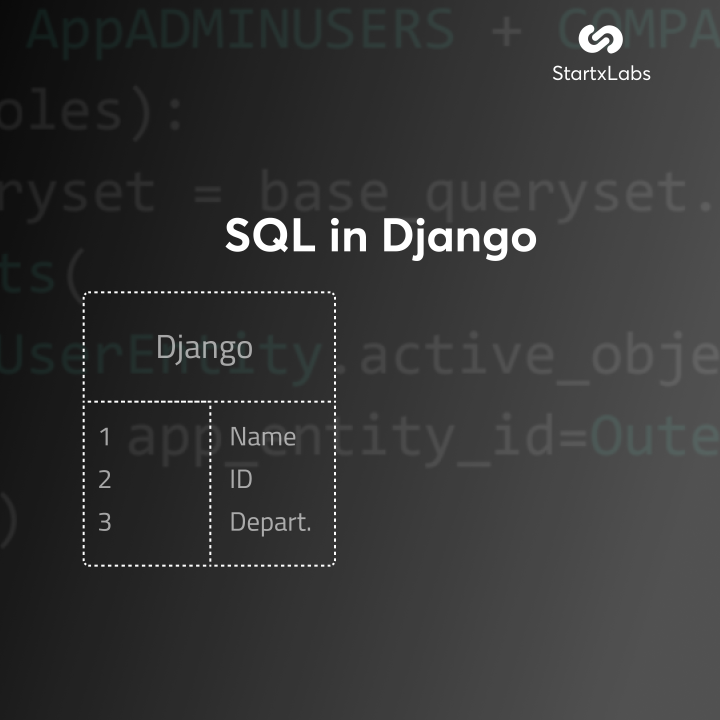
SQL in Django
StartxLabs
Custom Software | Mobile Apps | Automation | SaaS Platform development company
How Queries Work in Django:
Django, a high-level web framework, comes equipped with an Object-Relational Mapping (ORM) system that simplifies the process of interacting with databases. Here's a breakdown of how queries work in Django:
????1. Model Definition:
????????? In Django, a database table is represented by a Python class called a model.
????????? Each model class defines the fields and behaviours of the data structure, acting as a Pythonic representation of a database table.
????2. QuerySet Creation:
????????? Developers use QuerySets to query the database. A QuerySet is a high-level API that abstracts the SQL queries.
????????? QuerySets are constructed using methods like filter(), exclude(), and order_by(), all() etc allowing developers to build complex queries in a Pythonic way. - read more
????3. Lazy Evaluation ( Most Useful ) :
????????? Django uses lazy evaluation for QuerySets. This means that the actual database query is not executed until the QuerySet is evaluated for example - in code if we have not called the queryset then it will not do queries to the database and hence it lowers the load on the server.
????????? Lazy evaluation allows for the efficient chaining of methods and ensures that database queries are only executed when the results are needed.
????4. Database Agnosticism ( Can use many databases ):
????????? Django's ORM is database-agnostic, providing the flexibility to work with different database backends (e.g., PostgreSQL, MySQL) without changing the application code.?
????????? In our projects , we often use PostgreSQL since it is the most accurate database that suits our complex project and this is easy to use and has many features.
????5. Migrations:
????????? Django includes a migration system that manages changes to the database schema over time ( python manage.py makemigrations , migrate ).
????????? Migrations ensure that the database structure evolves along with changes to the models, maintaining consistency.?
????6. Security:
????????? Django's ORM helps prevent SQL injection attacks by using parameterized queries, where user inputs are automatically sanitised.
????????? This enhances the security of the application by preventing malicious SQL injection attempts.
Why Developers Don't Always Write Pure SQL:
????1. Abstraction and Readability:
????????? ORM allows developers to interact with the database using Python code, which is often more readable and easier to maintain than raw SQL.
领英推荐
????????? Abstraction simplifies common database tasks and makes the code more accessible to a wider range of developers and easy to understand.?
????2. Database Independence:
????????? ORM promotes database independence. Developers can write code that works with different database backends without worrying about specific SQL syntax for each database.
????3. Code Consistency:
????????? ORM encourages a consistent coding style across the project, making it easier for developers to collaborate.
????4. Security Measures:
????????? Django's ORM automatically protects against common security vulnerabilities like SQL injection by using parameterized queries.
????????? Writing raw SQL increases the risk of introducing vulnerabilities.
????5. Ease of Maintenance:
????????? ORM reduces the amount of boilerplate code needed for common database operations. This results in more concise and maintainable code.
????????? Maintenance tasks, such as adapting to schema changes, are handled seamlessly with migrations.
Capability to Write Raw Queries:
While Django's ORM is powerful, there are scenarios where developers might need to write raw SQL queries:
????1. Performance Optimization:
????????? In situations where fine-tuning performance is critical, developers might use raw SQL to write optimised queries tailored to the specific database engine.
????2. Database-Specific Features:
????????? Some databases offer unique features not fully supported by the ORM. Raw SQL queries provide a way to leverage these features.
????3. Complex Aggregations:
????????? Certain complex aggregations or calculations may be more efficiently expressed using raw SQL.
????4. Migration Challenges:
????????? In rare cases, complex database migrations might be challenging to express using Django's migration system, requiring the use of raw SQL.
In summary, while Django's ORM is a powerful tool for most database interactions, the capability to write raw SQL queries is retained for scenarios where specific optimizations, database features, or legacy system integrations are required. Developers can leverage the strengths of both approaches based on the needs of the application.
And at StartxLabs our team is capable of both and follows the best practices in the Industry.
Software Engineer| Odoo Development
10 个月waiting for a django update when it offers a feature of ORM for NoSQL dbs too??